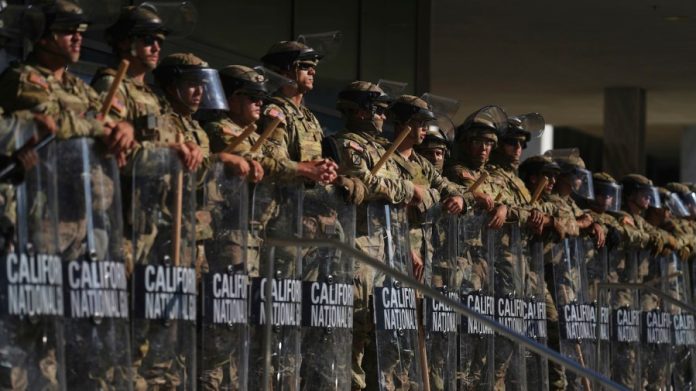
As Chicago braces for an influx of federal troops, it is critical to focus on last week’s ruling by a federal district court stating that President Trump’s June deployment of the National Guard to Los Angeles violated federal law. As national security experts who filed an amicus brief to support California’s challenge, we strongly support the holding of this case that the president has no authority to use federal troops to police America’s cities. This flagrant continued assault on U.S. cities and citizens is illegal, un-American and just plain wrong.
In a careful but ultimately devastasting rebuke of the administration, Judge Charles Breyer held in Newsom v. Trump that the government’s use of federal troops violated an 1878 statute called the Posse Comitatus Act, which forbids the government from using federal troops for law enforcement purposes. “The evidence at trial established that defendants systematically used armed soldiers … and military vehicles to set up protective perimeters and traffic blockades, engage in crowd control, and otherwise demonstrate a military presence in and around Los Angeles,” Breyer wrote. “In short, defendants violated the Posse Comitatus Act.”
The administration argued that this case fell under an exception to Posse Comitatus — first, because it claimed it was acting to protect federal persons and assets, and second, because it was suppressing a “rebellion” under a federal statute that authorized troop deployment when civil law is under threat. Breyer rejected these arguments, holding instead that the protective power and use of the federal statute in question required a showing that local officials were “unable or unwilling” to provide adequate protection. The government could not show this to be the case.
Further, he found the administration’s arguments wildly out of step with the act’s meaning, stating, “The court will not take defendants’ invitation to create a brand-new exception to the Posse Comitatus Act that nullifies the act itself.”
This is the first sustained opinion to interpret the Posse Comitatus Act by a federal judge, and it is a beacon of clarity in an area long considered murky and difficult to adjudicate.
Breyer also found that the federal government “contradicted their own training materials,” which listed 12 functions that were off-limits to federal troops as barred by Posse Comitatus. Breyer’s point here is supported by Department of Defense regulations, which we emphasized in our brief: The government cannot create rules and suspend them when convenient. Breyer characterized the department’s conduct as “part of a top-down, systematic effort by defendants to use military troops to execute various sectors of federal law … across hundreds of miles and over the course of several months — and counting.”
Using the National Guard for policing purposes erodes the longstanding distinction between military operations and civilian law enforcement. The Framers could not have been clearer in expressing their concern about this sort of abuse, and the Third Amendment, which forbids the quartering of military troops in houses, reflects a similar concern.
Federal courts have traditionally paid great deference to decisions by the president as commander in chief. In the context of foreign wars, that is appropriate. But when federal troops are used on U.S. soil, courts must intervene energetically to protect civil rights and ensure that the Framers’ fears about military dictatorship are heeded. These fears are not unfounded when the military is used to police political protests and to detain U.S. citizens engaged in constitutionally protected conduct. It should be the role of members of the military — who swear an oath to defend the U.S. Constitution — to safeguard rather than to threaten the constitutional rights of all American citizens.
Moreover, using military forces for law enforcement purposes is bad policy. Militaries are trained to neutralize threats, not to protect civil rights or preserve evidence at a crime scene. The U.S. military should be nearly exclusively focused on protecting the country against external threats, rather than turning military force against U.S. citizens and lawful residents where it lacks the expertise to do so lawfully.
The only exception to this should be circumstances of extreme rebellion such as those articulated in statutes like the Insurrection Act, but even then, as Breyer’s opinion made clear, there are limits to what federal troops can do under that authority. He explains that although the Insurrection Act is a recognized exception to the Posse Comitatus Act, the statute “imposes meaningful guardrails on the President’s authority,” and it cannot be invoked unless there is a request by a state or local officials are “unable or unwilling” to act.
Since June, the Trump administration has deployed thousands of U.S. troops to two American cities for a variety of stated purposes, and is threatening to continue these deployments across blue cities around the country. Worse, the president recently issued an executive order directing that specialized military units be established to address yet-to-materialize “civil disturbances.” Domestic policing by the military is no longer a temporary response to any specific incident — it is becoming a permanent mode of governance.
Breyer’s opinion in Newsom v. Trump details why the government’s attempts to use federal troops for policing tasks and to suppress dissent is illegal. Whatever the Ninth Circuit decides on the inevitable appeal of this decision, the ruling is a tour de force in an area of law that cried out for clarification, and one to which other federal courts should pay great deference.
Claire Finkelstein is the Algernon Biddle Professor of Law and professor of philosophy at the University of Pennsylvania, and faculty director of Penn’s Center for Ethics and the Rule of Law.
Mitt Regan is the McDevitt Professor of Jurisprudence and director of the Center on National Security and the Law and coordinator of the Program on Law, Ethics and International Security at Georgetown Law.
Brenner Fissell is professor of law at Villanova University and Vice President of the National Institute of Military Justice.

